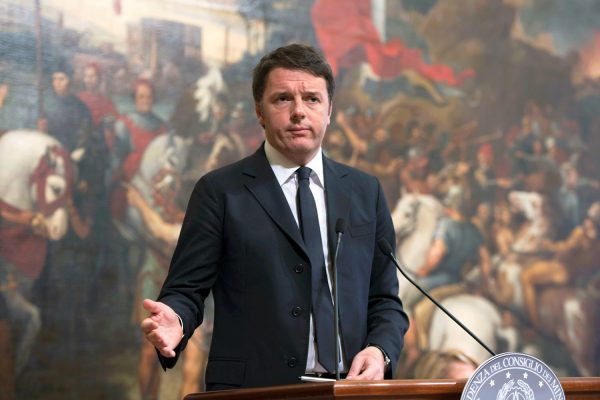
Matteo Renzi is being replaced as Italy’s prime minister this week, but the center-left party leader is already plotting his return to the Palazzo Chigi.
President Sergio Mattarella asked Paolo Gentiloni, Renzi’s foreign minister, to form a government on Sunday, which is expected to stay in power until elections can be held.
Italian media report that the outgoing prime minister is keen to call elections in early 2017 in order to stage a comeback.
That may prove difficult.
Because Italians rejected constitutional reforms in a referendum last week — which is what prompted Renzi to step down — the two houses of parliament would now be elected under different rules.
Renzi has also made enemies in his Democratic Party who may try to topple him before he has the chance to stand for reelection.
Different chambers, different rules
Democrats’ prospects for keeping control of the lower chamber look good under the electoral system that came into force earlier this year. It guarantees a majority of the seats to the party that wins at least 40 percent of the votes.
It’s a different story in the Senate.
Renzi’s plan was to strip the upper body of its lawmaking power and transform it into an assembly of regional deputies rather than directly-elected representatives.
Now those reforms have been rejected, another party, or coalition of parties, could win a majority in the Senate, blocking Renzi’s path back to the premiership.
An additional complication is that the Constitutional Court is due to rule on the legitimacy of the lower chamber’s electoral reforms.
Elections cannot be held before this is sorted out and that could take months.
Nemeses on the left
The longer it takes lawmakers to streamline the way both chambers are elected, the more time Renzi’s nemeses in the Democratic Party have to organize his removal.
The old left blames Renzi for alienating blue-collar and public-sector voters, who traditionally form the party’s backbone.
“Because of him, we lost teachers, blue-collar workers and trade unions along the way,” Luigi Manconi, a senator, told Politico.
Others accuse Renzi of surrendering not just working-class interests but the cause of social justice in pursuit of electoral and economic reform.
That seems unfair. It was Renzi’s government that legalized civil unions for gay couples and cut the time it takes to divorce from three years to six months.
But there is something to the claim that Renzi lost touch with the party’s grassroots.
Like social democrats elsewhere, Italy’s are struggling to maintain the coalition between working-class voters on the one hand and middle-income voters with socially liberal views on the other.
Renzi has sided more with the latter in reforming Italy’s complex labor laws. It is now easier for companies to hire and fire workers, which creates opportunities for younger, college-educated professionals. Older, unionized workers are worried their jobs may be at risk.
They needn’t be. Renzi’s reforms did not affect existing contracts. But his critics on the left have eagerly, and cynically, exploited such fears.
40 percent
Renzi’s supporters point out that, despite the defeat, more than thirteen million Italians — 40 percent of the electorate — voted in favor of the constitutional changes.
Lia Quartapelle, the Democrats’ foreign-policy spokesperson in parliament, cautions they must not be left in the cold.
“One of the mistakes of the remainers of the Brexit campaign is that they did not capitalize on the over 40 percent of votes they got,” she said. “We intend to do differently.”
Luca Lotti, a junior minister, similarly points out on Twitter that the Democrats won 40 percent support in the European Parliament elections under Renzi — up from 30 percent in the 2013 election under his more left-wing predecessor, Pier Luigi Bersani.
There may still be a constituency for Renzi to climb back to power. The question is, will his party let him try?
